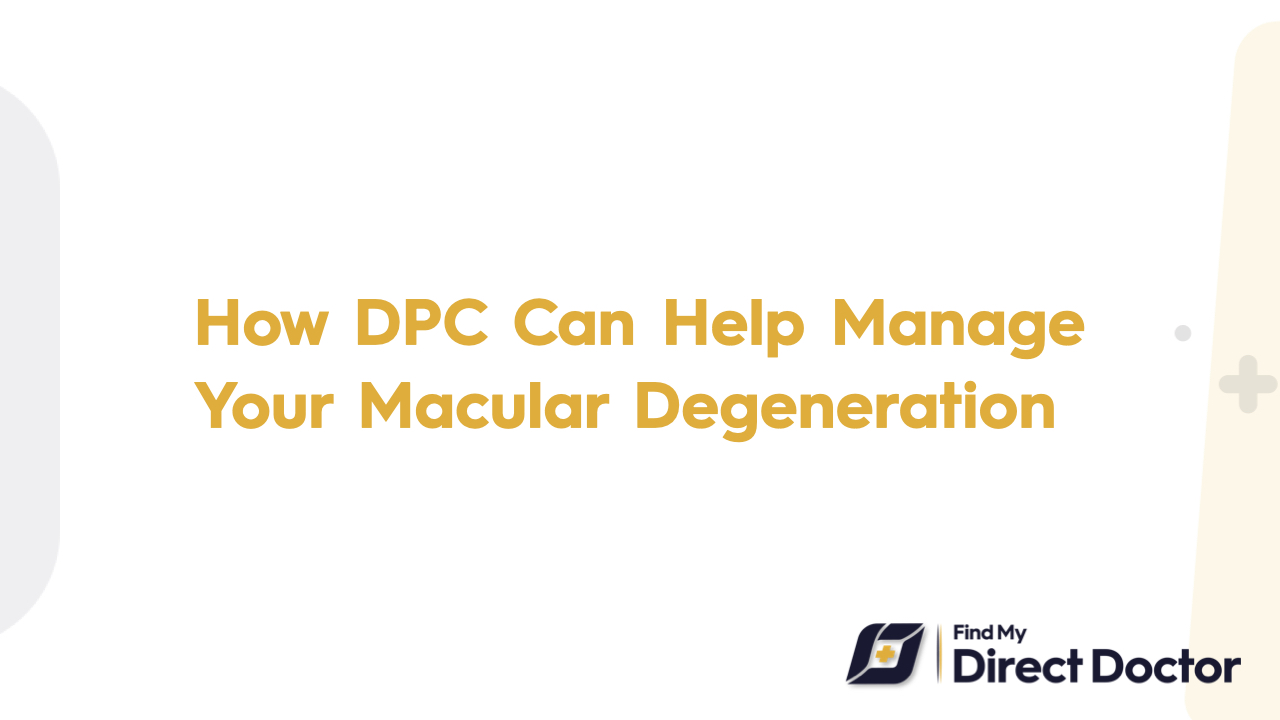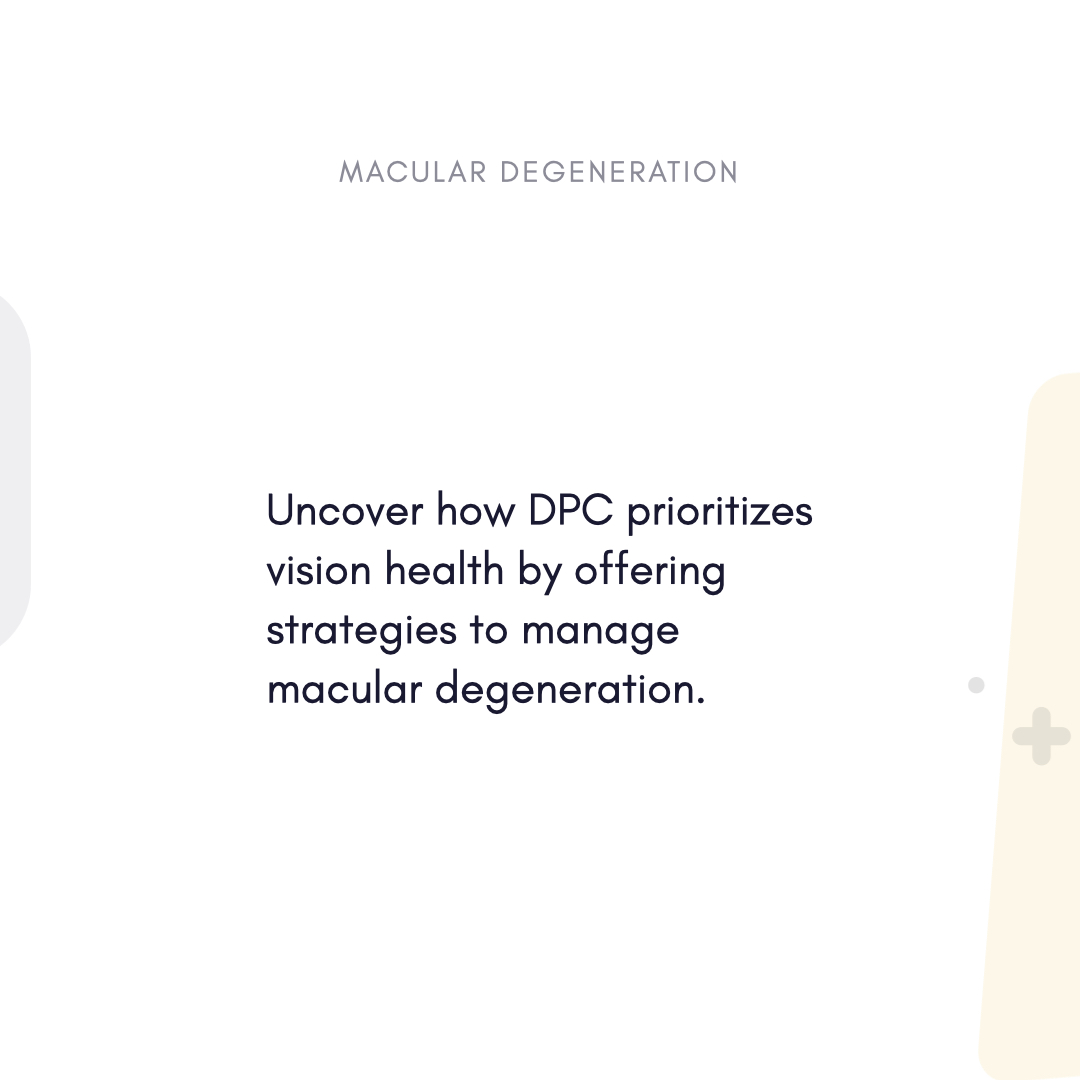Macular Degeneration and Direct Primary Care (DPC): Preserving Vision Through Personalized Care
If you have ever found it difficult to read a book, identify a face, or see wavy lines in your vision, you understand how macular degeneration (AMD) can rob the most important events of life. Affecting 20 million Americans, AMD is the main cause of adult over 50 vision loss. Combining early detection, lifestyle counseling, and flawless specialist coordination—no insurance delays or fragmented care—Direct Primary Care (DPC) provides a proactive, patient-first approach to manage AMD. Let us investigate how.

Recognising Macular Degeneration
AMD compromises the macula, the central area of the retina, which results in:
- Ninety percent of cases of dry AMD are Drusen deposits bringing about slow central vision loss.
- Abnormal blood vessels leaking fluid in wet AMD cause rapid vision distortion.
Important risk factors are:
- Age > 50, smoking, genetics (e.g., CFH gene).
- Obesity, cardiovascular disease, UV radiation.
Long-term hazards devoid of control:
- Legal blindness; loss of independence; depression.
DPC Transforms: How macOS Organization
Under the membership model known as Direct Primary Care (DPC), patients pay a monthly fee usually ranging from 50 to 150 USD for unlimited access to their provider. For AMD sufferers, this means care catered to your vision goals, no waiting months for Amsler grid follow-ups, and no surprise bills.
1. Early Prevention and Detection
DPC providers offer according American Academy of Ophthalmology recommendations, following:
- Tests for annual Amsler grids: Track vision changes at home and submit using an app.
- Control of risk factors: Plans for quitting smoking, BP/glucose control.
- Dietary advice includes leafy greens and AREDS2 supplements (vitamins C, E, zinc, lutein).
2. Perfect Specialist Coordination
- Same-day ophthalmologist visits for wet AMD symptoms—such as metamorphopsia—urgent referrals.
- Help negotiate prior authorizations for medications like aflibercept.
- Low vision resources: screen readers, audiobooks, or discounted magnifiers.
3. Reasonably Priced, Holistic Assistance
- Discounted supplements: AREDS2 formulations sold wholesale (25 USD/month instead of 50+ USD).
- Integrating mental health into daily life: Counseling for depression and anxiety linked to AMD.
- Preventive tech: UV-protected sunglasses, blue-light glasses.
Main Advantages of DPC for AMD Patients
- 24/7 access refers to: Text images of Amsler grids for fast wet AMD triage.
- Savings in expenses: Steer clear of 300+ USD ophthalmologist copays for normal surveillance.
- Lifestyle emphasis: slow down the development of AMD by diet and smoking avoidance.
Customized AMD Management in DPC
- Customize doses depending on genetic risk (e.g., CFH variants) using AREDS2 adherence.
- Plans of nutrition: Stress kale, spinach, and omega-3-rich fish.
- Prescribe varenicline or link to support groups for smoking cessation.
2. Wet AMD Vigilance
- Monthly self-checks: Teach patients to use Amsler grids at home.
- Coordinate injections within days of fluid detection for quick anti-VEGF access.
- Statins for cardiovascular health help to control comorbidity and slow down AMD progression.
3. Tools for Preserving Vision
- Low-vision aids: Work with occupational therapists for customised tools.
- Home safety audits help to improve lighting and lower trip hazards.
- Use community resources: Get in touch with nearby AMD support groups.
Personal Success Stories from Real Life
- Margaret, 68, preserved her reading vision by timely aflibercept injections after early wet AMD was discovered by DPC through an urgent referral.
- Case 2: Raj, 55, avoided legal blindness by following DPC's AREDS2 plan and stopping smoking, so slowing down the course of dry AMD.
Ask Questions About Macular Degeneration and DPC.
- Q: Is DPC able to replace my ophthalmologist?
- A: No; DPC controls risk factors and arranges urgent referrals, so complementing eye care.
- Q: Is DPC within AREDS2's budget?
- A: Absolutely! Thanks to DPC relationships, members save 50% on premium formulations.
- Q: Should I be tested genetically?
- A: DPC physician orders discounted panels—such as CFH gene—to customize prevention.
Why DPC Makes Sense for AMD
Preventive, patient-centered emphasis of the DPC model is crucial since:
- Early on, find wet AMD before irreversible vision loss.
- Slow dry AMD by addressing diet, hypertension, smoking, and lifestyle choices.
- Holistic treatment: Talk about the emotional toll vision loss causes in addition to your physical needs.
Save Your Vision with DPC's Preventive Maintenance Program
Macular degeneration need not darken your world. DPC provides a partner who helps you retain freedom and happiness by delivering early detection, lifestyle coaching, and specialist coordination. From Amsler grids to anti-VEGF access, DPC helps you to face AMD with confidence and clarity.






